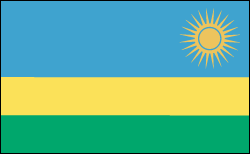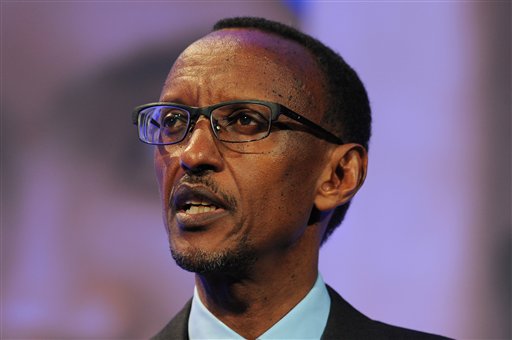Rwanda News & Current Events


Mass Genocide and Refugee Problems
In response, the Tutsi rebel force, the Rwandan Patriotic Front, swept across the country in a 14-week civil war, routing the largely Hutu government. Despite horrific reports of genocide, no country came to the Tutsi's assistance. The UN, already stationed in Rwanda at the time of the killing, withdrew entirely after ten of its soldiers were killed.
In the aftermath of the genocide, an estimated 1.7 million Hutu fled across the border into neighboring Zaire (now the Democratic Republic of the Congo). Although Tutsi rebels took control of the government, they permitted a Hutu, Pasteur Bizimungu, to serve as president, attempting to deflect accusations of a resurgence in Tutsi elitism and to foster national unity. Paul Kagame, the Tutsi rebel leader, became vice president and éminence grise.
Amid the legitimate refugees from the genocide were Hutu militiamen, who began waging guerrilla warfare from refugee camps in Zaire. The Hutu guerrillas in Zaire, as well as Zaire's threat to exile their own ethnic Tutsi, led to Rwanda's support of rebel forces, headed by Laurent Kabila, bent on overthrowing Zaire's Mobutu Sese Seko. But Rwanda soon grew disenchanted with Kabila's new regime. The Kabila government was not able to prevent the raids from Hutu guerrillas that continued to traumatize the country and destabilize the region. In Aug. 1998, a little more than a year after Kabila took over, a rebellion began against his reign, instigated by Rwanda and Uganda.
Refugee problems, continued massacres, and the horrific legacy of genocide continued to haunt the national psyche. In Sept. 1998, a UN tribunal sentenced Jean Kambanda, a former prime minister of Rwanda, to life in prison for his part in the 1994 genocide. He became the first person in history to be convicted for the crime of genocide, first defined in the 1948 Genocide Convention after World War II. By 2001, eight others had also been convicted of the same charge. The UN tribunal, however, was criticized for its inefficiency and slow pace. In Dec. 1999, an independent report, commissioned by the UN, took Kofi Annan and other UN officials to task for not intervening effectively in the genocide.
In April 2000, President Bizimungu resigned and Vice President Paul Kagame became the first Tutsi president of the nation. It was Kagame's rebel force that seized Rwanda's capital and put an end to the genocide in 1994.
Peace with the Democratic Republic of Congo and a New Constitution
Rwanda continued fighting against the Democratic Republic of the Congo throughout its four-year civil war. Finally, in July 2002, the two countries signed a peace accord: Rwanda promised to withdraw its 35,000 troops from the Congolese border; Congo in turn agreed to disarm the thousands of Hutu militiamen in its territory, who threatened Rwandan security.
In May 2003, 93% of Rwandans voted to approve a new constitution that instituted a balance of political power between Hutu and Tutsi. No party, for example, can hold more than half the seats in parliament. The constitution also outlawed the incitement of ethnic hatred. In Aug. 26 presidential elections, the first since the Rwandan genocide, Paul Kagame, who had served as president since 2000, won a landslide victory. In June 2004, Pasteur Bizimungu, the Hutu who had served as president between 1994 and 2000 (then–vice president Kagame held the real power), was sentenced to 15 years in prison on charges of inciting ethnic hatred. Many considered the trial politically motivated.
Economic and social conditions in Rwanda during President Kagame's first term improved markedly. He has clamped down on corruption and crime, per capita income doubled between 2000 and 2008, life expectancy increased, and nearly half of the country's children are completing primary school, compared to 20% pre-Kagame.
In 2004, a French judge asserted that Kagame was responsible for the 1994 downing of a plane that killed the presidents of both Rwanda and Burundi and set off ethnic violence that killed some 800,000 Tutsi and moderate Hutu. Kagame vehemently denied the charge. In 2008, Rose Kabuye, a senior aide to Kagame, was arrested at Frankfurt International Airport on a warrant from France and charged in connection with the crash.
A UN court in Dec. 2008 convicted Col. Theoneste Bagosora, a Hutu extremist, of genocide for his involvement in the 1994 massacre of 800,000 Tutsi and moderate Hutu. He is the highest-ranking military official charged in connection with the genocide. Several other prominent officials were later tried and sentenced to life in prison.
Despite the economic and social gains made under Kagame, hints of repression emerged in the months leading up to Aug. 2010's presidential election. Two opposition leaders were killed, a former army leader who has been critical of Kagame was shot in South Africa, and Victoire Ingabire Umuhoza, the leader of an party who intended to challenge Kagame, was arrested on charges of promoting genocide. (She was sentenced to eight years in prison in November 2012.) Nevertheless, Kagame was reelected, taking 93% of the vote.
Pierre Damien Habumuremyi was appointed as prime minister and sworn in on Oct. 7, 2011. There was no change in key cabinet portfolios. Habumuremyi served as prime minister until he was replaced by Public Service and Labor Minister Anastase Murekezi in July 24, 2014.
Parliament Votes in Favor of Third Term for Kagame

Rwanda's President Paul Kagame, 2012
Source: AP Photo/Carl Court, File, Pool
In Sept. 2015, a seven-member constitution commission was appointed to review possible changes that would allow Paul Kagame a third term as president. The move followed a vote by both houses of parliament that supported a constitutional change and a petition signed by 3.7 million, 60% of voters, in favor of it. However, some reports alleged that officials forced voters to sign the petition.
Meanwhile, also in Sept., the Supreme Court heard a challenge opposing changes to the constitution by the Democratic Green Party, the country's main opposition party. The United States has repeatedly stated its opposition to a third term for Kagame. On Sept. 4, the U.S. Department of State released a statement expressing "concern" over the possibility of Rwanda changing the constitution to allow Kagame to remain in power. The statement said, "We continue to firmly support the principle of democratic transition of power in all countries through free, fair, and credible elections, held in accordance with constitutions, including provisions regarding term limits. We do not support those in positions of power changing constitutions solely for their political self-interest."
Kagame was elected in 2003 and 2010. He has not stated directly whether he would seek a third term. However, he has said that any decision on a third term would be for the "Rwandan people."
See also Encyclopedia: Rwanda .
U.S. State Dept. Country Notes: Rwanda







